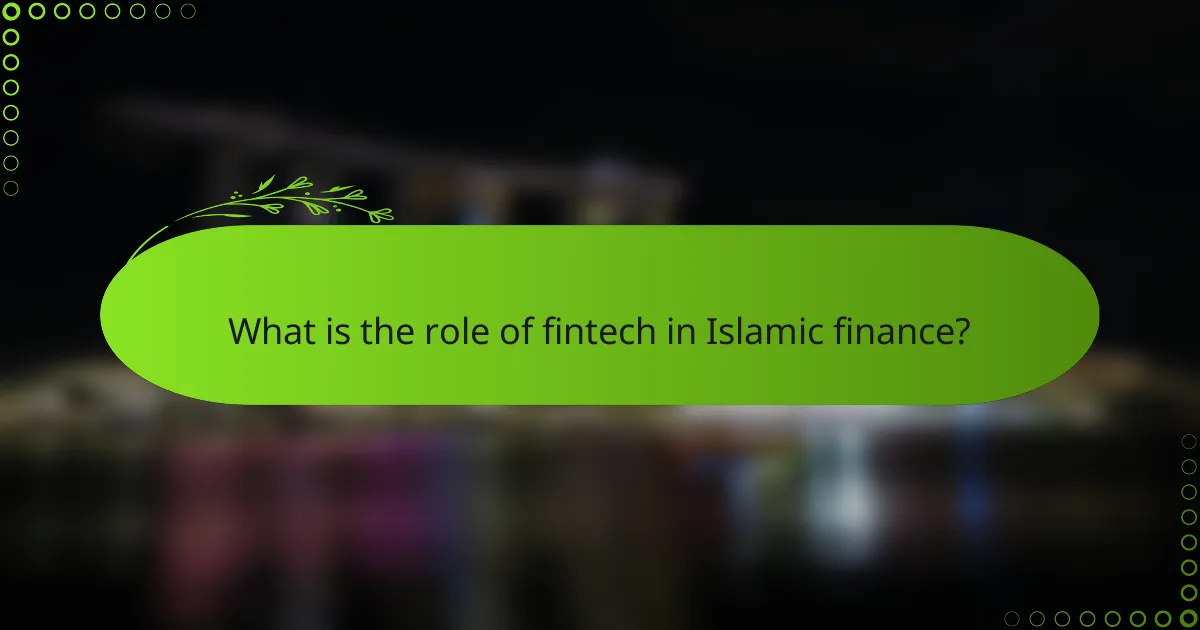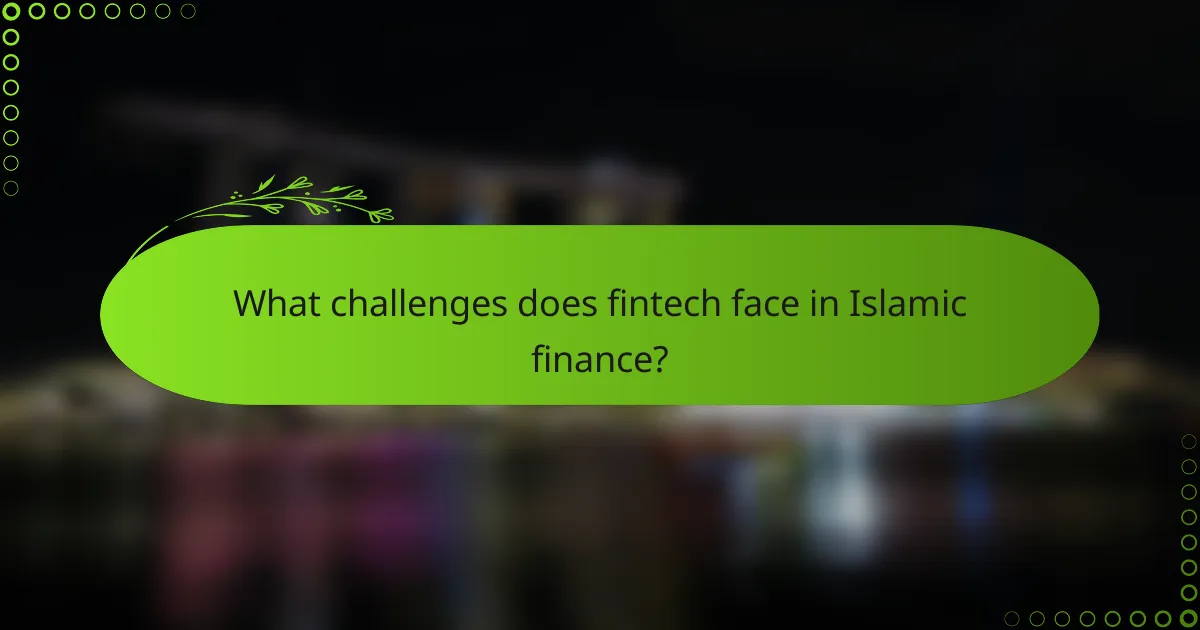
What is the role of fintech in Islamic finance?
Fintech plays a crucial role in Islamic finance by enhancing accessibility and efficiency. It provides innovative solutions that align with Shariah principles. Digital platforms facilitate transactions without interest, adhering to Islamic law. Fintech also enables microfinance, allowing small businesses to access capital. Blockchain technology enhances transparency and traceability in financial transactions. Additionally, fintech solutions support Islamic crowdfunding, connecting investors with ethical projects. The integration of artificial intelligence aids in compliance with Shariah regulations. Overall, fintech fosters financial inclusion and drives the growth of Islamic finance globally.
How does fintech align with Islamic finance principles?
Fintech aligns with Islamic finance principles by promoting transparency, efficiency, and ethical investment. Islamic finance prohibits interest (riba) and promotes risk-sharing. Fintech solutions, such as peer-to-peer lending platforms, facilitate these principles by enabling profit-sharing models. Blockchain technology enhances transparency in transactions, aligning with the Islamic principle of fairness. Additionally, fintech innovations can provide Sharia-compliant investment options, ensuring adherence to Islamic law. Studies show that fintech can increase financial inclusion in Muslim communities, addressing the gap in access to financial services. This alignment fosters growth in Islamic finance, attracting a broader audience.
What are the key principles of Islamic finance that fintech must adhere to?
The key principles of Islamic finance that fintech must adhere to include the prohibition of riba, or interest. Riba is considered exploitative and unjust in Islamic teachings. Fintech solutions must also comply with the concept of risk-sharing. This principle encourages equitable distribution of risk between parties involved in a financial transaction. Additionally, Islamic finance emphasizes ethical investments. Investments must be made in businesses that do not engage in activities considered haram, or forbidden, such as alcohol or gambling.
Moreover, fintech must ensure transparency in transactions. This aligns with the Islamic principle of honesty and fairness in financial dealings. The avoidance of gharar, or excessive uncertainty, is also essential. Contracts should be clear and well-defined to prevent ambiguity. Lastly, fintech innovations should promote social welfare. This reflects the Islamic value of contributing positively to society and supporting community development.
How do these principles influence fintech innovations?
Islamic finance principles significantly influence fintech innovations by promoting ethical and Sharia-compliant financial solutions. These principles emphasize risk-sharing, profit-sharing, and the prohibition of interest. Fintech companies leverage these principles to create products that align with Islamic law. For instance, peer-to-peer lending platforms may adopt profit-sharing models instead of traditional interest-based lending.
Moreover, fintech innovations like blockchain are utilized to enhance transparency and traceability in transactions. This aligns with Islamic finance’s focus on ethical dealings and accountability. A report by PwC indicates that the global Islamic fintech market is expected to reach $128 billion by 2025, highlighting the growing demand for compliant financial solutions.
Thus, Islamic finance principles shape fintech innovations by fostering ethical practices and creating new market opportunities.
What innovations are emerging in the fintech space for Islamic finance?
Innovations in the fintech space for Islamic finance include blockchain technology, artificial intelligence, and mobile banking solutions. Blockchain enhances transparency and security in transactions. It allows for real-time tracking of assets, which aligns with Sharia principles. Artificial intelligence is being used for credit scoring and risk assessment. This improves financial inclusion for underserved populations. Mobile banking solutions are expanding access to Islamic financial products. They provide convenient platforms for users to engage in compliant transactions. Additionally, peer-to-peer lending platforms are emerging, facilitating interest-free lending options. These innovations collectively enhance the efficiency and accessibility of Islamic finance.
What are the latest technological advancements in Islamic fintech?
Recent technological advancements in Islamic fintech include the integration of blockchain technology. Blockchain enhances transparency and security in transactions. Artificial intelligence is being used for credit scoring and risk assessment. This improves compliance with Shariah principles. Additionally, mobile banking applications are expanding access to financial services. They cater specifically to the needs of Muslim consumers. Digital payment solutions are also evolving, offering Shariah-compliant options. These advancements facilitate faster and more efficient transactions. According to the Global Islamic Fintech Report 2022, the sector is projected to grow significantly, indicating a strong demand for such innovations.
How are blockchain and AI transforming Islamic finance practices?
Blockchain and AI are significantly transforming Islamic finance practices by enhancing transparency and efficiency. Blockchain technology provides a decentralized ledger that ensures secure and immutable transactions. This transparency aligns with Islamic finance principles, which emphasize ethical dealings and accountability. AI contributes by automating compliance processes, reducing human error, and improving risk assessment. For instance, AI algorithms can analyze vast amounts of data to identify potential risks and ensure adherence to Sharia law. The integration of these technologies also facilitates quicker transaction settlements, enhancing customer satisfaction. According to a report by PwC, 77% of financial institutions believe that blockchain will be a critical part of their operations in the future. This indicates a strong belief in the potential of these technologies to reshape the financial landscape, including Islamic finance.

What challenges does fintech face in Islamic finance?
Fintech faces several challenges in Islamic finance. One significant challenge is ensuring compliance with Shariah law. This requires fintech companies to develop products that adhere strictly to Islamic principles. Another challenge is the lack of standardization in Shariah interpretations across different regions. This inconsistency can lead to confusion and hinder product acceptance. Additionally, there is a limited understanding of fintech solutions among traditional Islamic finance institutions. This gap can slow down collaboration and integration efforts. Furthermore, regulatory frameworks in many countries are still evolving. This can create uncertainty for fintech companies trying to navigate the landscape. Lastly, there is a need for consumer education about fintech products in Islamic finance. Many potential users may not be aware of the benefits and functionalities of these innovative solutions.
What regulatory hurdles impact fintech in Islamic finance?
Regulatory hurdles impacting fintech in Islamic finance include compliance with Sharia law, varying interpretations of Islamic finance principles, and lack of standardized regulations. Fintech firms must ensure their products align with Sharia compliance, which can be complex due to differing opinions among scholars. Additionally, regulatory frameworks often vary by country, leading to inconsistencies in compliance requirements. The absence of a unified regulatory body for Islamic finance further complicates the landscape for fintech companies. These challenges can hinder innovation and limit the scalability of fintech solutions in the Islamic finance sector.
How do different jurisdictions approach fintech regulations for Islamic finance?
Different jurisdictions approach fintech regulations for Islamic finance by varying their frameworks and guidelines. Some countries, like Malaysia and Indonesia, have established specific regulatory bodies to oversee Islamic fintech. These nations promote Sharia-compliant financial products while ensuring consumer protection.
In contrast, jurisdictions such as the United Kingdom adopt a more principles-based regulatory approach. They emphasize innovation while maintaining compliance with Islamic finance principles. This flexibility fosters a conducive environment for fintech startups.
Additionally, the Gulf Cooperation Council (GCC) countries have implemented unified regulatory frameworks. These frameworks aim to standardize practices across member states. They focus on enhancing the growth of Islamic fintech while addressing regulatory challenges.
Overall, the regulatory landscape for Islamic finance fintech varies significantly across jurisdictions. Each region tailors its approach to balance innovation and compliance with Sharia law.
What are the compliance challenges faced by fintech companies?
Fintech companies face significant compliance challenges due to regulatory complexity. These challenges arise from varying regulations across different jurisdictions. Fintech firms must navigate anti-money laundering (AML) and know your customer (KYC) requirements. Adhering to data protection laws, such as GDPR, is also critical. Additionally, fintech companies often struggle with evolving regulations that can change rapidly. The lack of clear guidelines can lead to uncertainty in compliance practices. Financial authorities may impose heavy penalties for non-compliance, which adds pressure on these firms. A study by Deloitte highlights that 70% of fintech companies cite regulatory compliance as a major barrier to growth.
What market challenges are present for fintech in Islamic finance?
Market challenges for fintech in Islamic finance include regulatory compliance, lack of awareness, and limited infrastructure. Regulatory compliance poses difficulties due to varying interpretations of Sharia law across regions. Fintech firms must navigate complex regulations that can differ significantly. Lack of awareness among consumers about fintech solutions limits market [censured]. Many potential users are unfamiliar with digital finance options. Limited infrastructure in some regions hampers the adoption of fintech services. Access to reliable internet and digital literacy is crucial for success. These challenges create barriers to growth in the Islamic finance sector. Addressing these issues is essential for fintech’s future in this market.
How do cultural perceptions affect the adoption of fintech in Islamic finance?
Cultural perceptions significantly influence the adoption of fintech in Islamic finance. Islamic finance is governed by Sharia law, which emphasizes ethical and interest-free financial practices. Cultural beliefs about financial transactions can either facilitate or hinder the acceptance of fintech solutions. For instance, trust in technology varies across cultures, affecting user engagement with fintech platforms. In regions where traditional banking is deeply rooted, skepticism towards digital alternatives can arise. Additionally, cultural norms regarding privacy and data security can impact the willingness to share personal information with fintech providers. Studies indicate that cultural alignment between fintech offerings and Islamic values enhances user adoption. Therefore, understanding cultural perceptions is crucial for fintech companies aiming to succeed in Islamic finance.
What competition exists between traditional Islamic banks and fintech startups?
Traditional Islamic banks face significant competition from fintech startups. Fintech startups offer innovative financial solutions that appeal to tech-savvy consumers. They provide faster, more efficient services compared to traditional banks. Many fintech companies focus on niche markets, including Islamic finance. This specialization allows them to cater to specific customer needs effectively. Additionally, fintech startups often have lower operational costs. This enables them to offer competitive pricing and better rates. Traditional Islamic banks may struggle to adapt to rapid technological changes. This lag can result in loss of market share to agile fintech firms. The competition is reshaping the landscape of Islamic finance.

What opportunities lie ahead for fintech in Islamic finance?
Fintech has significant opportunities in Islamic finance due to its compatibility with Sharia-compliant principles. The growing demand for ethical banking solutions drives innovation in this sector. Digital platforms can streamline processes like crowdfunding and peer-to-peer lending while adhering to Islamic law. Additionally, the rise of mobile banking enhances accessibility for underserved populations. Regulatory support for fintech initiatives encourages collaboration between traditional banks and tech firms. Research indicates that Islamic fintech could capture a larger market share, projected to reach $128 billion by 2025. These factors create a conducive environment for fintech growth within Islamic finance.
How can fintech enhance financial inclusion in Islamic finance?
Fintech can enhance financial inclusion in Islamic finance by providing accessible financial services to underserved populations. It leverages technology to offer Sharia-compliant financial products. These products can include microfinancing, digital banking, and peer-to-peer lending. Fintech platforms reduce operational costs, making services affordable. They also utilize mobile technology to reach remote areas, increasing accessibility. According to a report by the Islamic Financial Services Board, fintech adoption can potentially increase the Islamic finance market size significantly. This growth can lead to improved economic participation and empowerment for marginalized communities.
What demographic trends support the growth of fintech in Islamic finance?
Young populations in Muslim-majority countries are driving the growth of fintech in Islamic finance. Over 60% of the population in regions like the Middle East and Southeast Asia is under 30 years old. This demographic is more tech-savvy and open to digital solutions. Increasing smartphone [censured] further supports this trend. For example, smartphone usage in the Middle East reached 90% in 2022. Additionally, rising income levels among young professionals create a demand for innovative financial products. The World Bank reports that the middle class in these regions is expanding, leading to greater financial inclusion. These factors collectively enhance the adoption of fintech solutions tailored to Islamic finance principles.
How can fintech solutions address the needs of underserved communities?
Fintech solutions can address the needs of underserved communities by providing accessible financial services. These services include mobile banking, which allows users to manage finances without needing a physical bank. Fintech platforms often have lower fees than traditional banks, making them more affordable. They also offer microloans, which help individuals start small businesses or cover emergencies. Data analytics enable fintech companies to assess creditworthiness for those without traditional credit histories. According to the World Bank, 1.7 billion adults remain unbanked globally, highlighting the demand for these solutions. Furthermore, fintech can enhance financial literacy through educational tools, empowering users to make informed decisions.
What potential partnerships could benefit fintech in Islamic finance?
Partnerships between fintech companies and Islamic banks could significantly enhance Islamic finance. These collaborations can streamline compliance with Shariah law. Fintech firms can provide innovative technology solutions. This includes blockchain for transparent transactions and AI for risk assessment. Collaborations with regulatory bodies can ensure adherence to Islamic finance principles. Partnerships with educational institutions can foster research and development in Islamic fintech. Additionally, alliances with global fintech companies can facilitate cross-border transactions. These partnerships can expand market reach and improve customer experience.
How can collaborations between fintech and traditional Islamic banks be structured?
Collaborations between fintech and traditional Islamic banks can be structured through strategic partnerships and technology integration. Fintech companies can provide innovative solutions that enhance the customer experience. Traditional Islamic banks can leverage these technologies to improve operational efficiency. Joint ventures can be formed to co-develop products that comply with Sharia principles. Regulatory frameworks should be established to ensure compliance with Islamic finance standards. Data sharing agreements can facilitate better risk assessment and customer insights. Collaborative marketing efforts can increase awareness of new offerings. These structured collaborations can lead to improved financial inclusion in the Islamic finance sector.
What role do fintech accelerators and incubators play in this space?
Fintech accelerators and incubators support startups in the fintech sector by providing resources and mentorship. They facilitate access to funding, which is crucial for early-stage companies. These programs often offer networking opportunities with industry experts and potential investors. Additionally, they provide educational resources tailored to the fintech landscape. This guidance helps startups navigate regulatory requirements specific to Islamic finance. Research indicates that startups in accelerators have a higher success rate than those without such support. For instance, a study by the Global Accelerator Report found that 76% of accelerator graduates raised follow-on funding. This demonstrates the significant role these entities play in fostering innovation within the fintech space, particularly in Islamic finance.
What best practices should fintech companies adopt in Islamic finance?
Fintech companies should adopt Sharia-compliant practices in Islamic finance. This includes avoiding interest-based transactions, which are prohibited in [censured]. They must ensure transparency in their operations and products. Implementing ethical investment strategies is crucial. Fintech firms should also focus on risk-sharing models, as they align with Islamic principles. Additionally, providing educational resources about Islamic finance can enhance customer understanding. Collaborating with Islamic scholars can ensure compliance with Sharia law. Lastly, leveraging technology for efficient and secure transactions is essential. These practices support the growth of Islamic finance within the fintech sector.
How can fintech companies ensure Sharia compliance in their offerings?
Fintech companies can ensure Sharia compliance by adhering to Islamic finance principles. They should engage Sharia scholars to guide product development. Regular audits by these experts can verify compliance. Utilizing halal investment opportunities is essential. Transparency in fees and contracts aligns with Sharia law. Additionally, fintech firms must avoid interest-based transactions. They should promote risk-sharing models instead. Studies show that adherence to these practices fosters trust among Muslim consumers.
What strategies can fintech firms implement to build trust with Islamic finance consumers?
Fintech firms can build trust with Islamic finance consumers by ensuring compliance with Sharia principles. Transparency in operations fosters confidence. Clear communication about product structures is essential. Providing educational resources on Islamic finance enhances understanding. Partnering with reputable Islamic scholars adds credibility. Implementing robust security measures protects consumer data. Regular audits by Sharia boards ensure ongoing compliance. These strategies align with the expectations of Islamic finance consumers, leading to stronger relationships.
The main entity of the article is fintech within the context of Islamic finance. The article explores the pivotal role of fintech in enhancing accessibility and efficiency while adhering to Shariah principles. It examines how innovations such as blockchain and artificial intelligence are transforming Islamic finance practices, the challenges fintech faces regarding compliance and market acceptance, and the opportunities for growth in this sector. Additionally, it highlights demographic trends supporting fintech adoption and the potential for partnerships between fintech companies and traditional Islamic banks to foster financial inclusion and ethical investment.